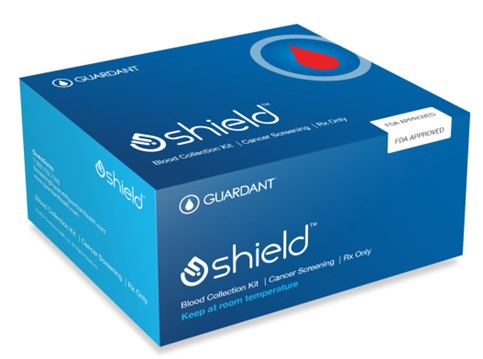Shield – P230009
This is a brief overview of information related to FDA’s approval to market this product. See the links below to the Summary of Safety and Effectiveness Data (SSED) and product labeling for more complete information on this product, its indications for use, and the basis for FDA’s approval.
Product Name: Shield
PMA Applicant: Guardant Health, Inc.
Address: 505 Penobscot Dr. Redwood City, CA 94063
Approval Date: July 26, 2024
Approval Letter: Approval Order
What is it?
Shield is a blood test that detects DNA mutations that happen in cancer cells (somatic mutations) and changes in the chemical structure of DNA that don’t change the DNA’s coding sequence (epigenomic alterations such as methylation and fragmentation pattern) that can mean someone has colorectal cancer. This test is for adults who are 45 years or older with an average risk for colorectal cancer and who need to undergo colorectal cancer screening.
- A health care provider draws up to four tubes of blood using the Guardant Shield Blood Collection Kit. There is no special preparation needed prior to the blood sample collection.
- The blood sample is sent to the Guardant Health Clinical Laboratory for processing and testing.
- In the laboratory, the blood is spun to separate blood cells from the plasma.
- DNA is then isolated from the plasma sample and mixed with chemical substances, called reagents, that find and analyze the DNA sequences of cancer-related genes and the alterations (methylation and fragmentation) of cancer-related DNA regions looking for tumor DNA in the blood sample.
- Based on analysis of genomic mutations, methylation and fragmentation patterns, a positive or negative test result is determined.
- Test results are sent to the patient’s doctor who uses this information to help manage the next steps.
- People with positive results are advised to have a diagnostic colonoscopy.
- People with a negative Shield test result should continue participating in colorectal cancer screening.
Shield is for adults 45 years or older, who have an average risk of colorectal cancer and need to undergo colorectal cancer screening.
Shield is not a replacement for diagnostic colonoscopy, or for surveillance colonoscopy in people with a high risk for colorectal cancer.
Shield helps doctors determine if someone has colorectal cancer. Clinical study results including 7,861 people showed that Shield is able to detect colorectal cancer 83% of the time One out of 10 people who do not have advanced abnormal cells (neoplasia) will have a false positive Shield test result.
Negative Shield test results do not guarantee someone does not have colorectal cancer.
Shield should not be used to screen people who are under 45 years of age or at higher risk for colorectal cancer, including those with:
- History of colorectal cancer, adenomas, or other related cancers.
- A positive result from another colorectal cancer screening method within the last 6 months.
- A condition that places them at higher risk for colorectal cancer.
- A relevant cancer syndrome passed on from their family (hereditary).

